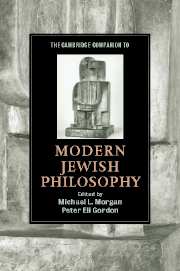Book contents
- Frontmatter
- 1 Introduction: Modern Jewish Philosophy, Modern Philosophy, and Modern Judaism
- 2 Baruch Spinoza and the Naturalization of Judaism
- 3 The Liberalism of Moses Mendelssohn
- 4 Jewish Philosophy after Kant The Legacy of Salomon Maimon
- 5 Hermann Cohen: Judaism and Critical Idealism
- 6 Self, Other, Text, God: The Dialogical Thought of Martin Buber
- 7 Franz Rosenzweig and the Philosophy of Jewish Existence
- 8 Leo Strauss and Modern Jewish Thought
- 9 Messianism and Modern Jewish Philosophy
- 10 Ethics, Authority, and Autonomy
- 11 Joseph Soloveitchik and Halakhic Man
- 12 Emmanuel Levinas: Judaism and the Primacy of the Ethical
- 13 Emil Fackenheim, the Holocaust, and Philosophy
- 14 Evil, Suffering, and the Holocaust
- 15 Revelation, Language, and Commentary: From Buber to Derrida
- 16 Feminism and Modern Jewish Philosophy
- Bibliography
- Index
4 - Jewish Philosophy after Kant The Legacy of Salomon Maimon
Published online by Cambridge University Press: 28 September 2007
- Frontmatter
- 1 Introduction: Modern Jewish Philosophy, Modern Philosophy, and Modern Judaism
- 2 Baruch Spinoza and the Naturalization of Judaism
- 3 The Liberalism of Moses Mendelssohn
- 4 Jewish Philosophy after Kant The Legacy of Salomon Maimon
- 5 Hermann Cohen: Judaism and Critical Idealism
- 6 Self, Other, Text, God: The Dialogical Thought of Martin Buber
- 7 Franz Rosenzweig and the Philosophy of Jewish Existence
- 8 Leo Strauss and Modern Jewish Thought
- 9 Messianism and Modern Jewish Philosophy
- 10 Ethics, Authority, and Autonomy
- 11 Joseph Soloveitchik and Halakhic Man
- 12 Emmanuel Levinas: Judaism and the Primacy of the Ethical
- 13 Emil Fackenheim, the Holocaust, and Philosophy
- 14 Evil, Suffering, and the Holocaust
- 15 Revelation, Language, and Commentary: From Buber to Derrida
- 16 Feminism and Modern Jewish Philosophy
- Bibliography
- Index
Summary
Blessed be God, who has given of His wisdom to Kant.
Isaac BreuerSince the end of the eighteenth century, no non-Jewish philosopher has been more central to Jewish philosophy than Kant. The major Jewish philosophers of late modernity have worked out their positions in relation to Kant, sometimes through the mediation of post-Kantians such as Hegel, Schelling, and Schopenhauer - just as the major ancient and medieval Jewish philosophers worked out their positions in relation to Plato, sometimes through the mediation of post-Platonists such as Aristotle, Plotinus and Alfarabi. What is the cause of Jewish philosophy’s intimate relation to Kant?
One explanation is that Kant’s career coincided with the entry of Jews into German academic and intellectual life, a development to which Kant was openly sympathetic and for which justification could be found in his philosophy, with its doctrine of equal respect for each rational being. When Moses Mendelssohn visited Kant’s lectures in Königsberg, Kant is said to have silenced the students' anti-Semitic jeers by greeting the great Jewish philosopher with a show of respect. Kant had several Jewish students, including Markus Herz, whom he chose to defend his (Kant’s) inaugural dissertation in 1770. These students, to whom an academic career was open only if they converted to Christianity, chose instead to promote Kantianism from within the Jewish community.
- Type
- Chapter
- Information
- The Cambridge Companion to Modern Jewish Philosophy , pp. 53 - 79Publisher: Cambridge University PressPrint publication year: 2007
- 3
- Cited by



